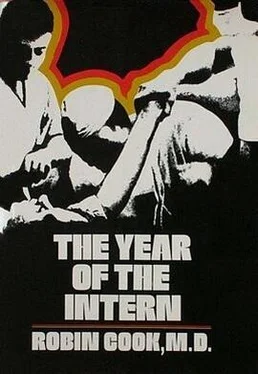Screw, I thought. “Okay, Straus, don’t touch anything.” “Big Ben” said five after three. Needle points — in fact, whole needles — were almost impossible to find once you lost them. Luckily, I could see the upper part of this one flush with the surface of the skin. “Mosquito clamp.” Without taking my eyes off the almost invisible needle point, I reached toward the scrub nurse. Wham. The force of the delicate instrument sent a shock wave up my arm, vibrating my field of vision. The broken needle vanished. I scowled at the scrub nurse. She was a hulk, practically spherical, who surely outweighed me by a good twenty pounds, and her glare at that moment held such unexpected malice that I declined the opportunity of saying anything.
Instead, I concentrated on the delicate mosquito clamp, which was, at any rate, still in one piece in my tingling hand. By placing my left index finger in the incision and pulling up slightly under the broken needle, I was able to get some resistance before I attempted to grasp the embedded piece of steel. Still, the first attempt only succeeded in pushing the damn thing a little farther in. That was when I decided to finish both the suturing and the tying myself. The second attempt was more successful; withdrawing the clamp, I was relieved to see the gleaming needle point firmly caught on the end of it, and with a watchmaker’s care I deposited the broken point on the corner of the instrument tray, matching the piece with its base to be absolutely sure there were no missing segments. Satisfied, I asked for a suture, avoiding a look at Straus.
The skin indented under the perpendicular needle as I raised the pressure until, with a pop, the needle broke through the skin. Rolling my wrist in an arc whose center shifted to eliminate torque on the needle point — the force Straus had ignored — I brought the needle point to the undersurface of the skin on the opposite side of the incision. Against the counterpressure exerted by the index and middle fingers of my left hand, I gave a decisive, crisp final twist of my right hand, and the needle point burst forth. Plucking the needle out with the needle holder completed the stitch. I detached the thread by lifting the needle holder so that the eye of the needle pointed upward; the drag on the end of the thread looping through the skin pulled the thread from the instrument.
Following the accepted routine, I dropped the empty needle holder into the draped area between the patient’s legs. The scrub nurse would automatically retrieve the instrument and rethread it. Meanwhile, I snatched up the end of the thread, laid four throws of a square knot, and finished with the two ends on a stretch. Only then did I look at Straus.
“How about cutting, Straus?” I said.
He moved without answering, cut the thread, and continued looking at the incision. Ten more sutures were placed in like manner, rapidly and without conversation. After cutting a piece of paper tape and placing it over the closed incision, I turned to Straus. “Why don’t you write the postoperative orders? You’ve got to start sometime. I’ll look them over after I change. Then I’ll introduce you to your patients. Okay?”
“Okay,” he said finally, in a flat tone.
“Also,” I continued, “I’ll show you what I know about suturing and tying if you want.” Straus didn’t say another word.
What a drag, I thought. If he’s tired already, he’ll have a long, long year. But that was his problem, and his attitude didn’t bother me for long; I had too much to do. Dropping my gloves in the bag by the door, I left the OR for the last time as an intern without the slightest feeling of nostalgia. In fact, I was euphoric. I felt I had done my time and was ready to be a resident — very ready. Medical practice was at last within sight. As I walked down the OR corridor, I wondered whether to buy a Mercedes or a Porsche. I’d always wanted a Porsche, but they were, after all, a little impractical. A Cadillac? I’d never own a Cadillac. What an obscene automobile! — although it was a favorite with surgeons. Hercules had one, and Supercharger, too. Anyway, a Mercedes sounded better to me.
The menu called them veal croquettes, but to us they were mystery mounds; ketchup was the antidote. Like that of most hospital cafeterias, the food here required a vivid and willing imagination on the part of the diner. If the menu said veal, it was best to cling tenaciously to the notion of veal, despite evidence to the contrary in taste, texture, and appearance. It was also helpful to suppress any knowledge of slaughterhouse malpractices, to be very hungry, and to be blessed with good conversation.
In fairness, I suppose the cafeteria cuisine in Hawaii was cordon bleu compared to hospital cafeterias I had seen during medical school in New York. Yet even in Hawaii the food service occasionally resorted to mysterious patties of ground meat, and, as if helping me celebrate, they picked this night to serve the veal one of my favorite conversation pieces. Also, I was still on call. Even so, the meal was like a banquet. It was my last night as an intern, and yet I was already a step removed from the battleground. Straus would undoubtedly be the first line of defense if and when trouble started.
The climate in the dining room was pleasant. Crisp, thin shafts of sunlight cut through cracks in and around the blinds on the windows facing the southwest. Specks of dust danced in and out of the golden beams of light, like bacteria under a microscope. Leave it to a doctor to think of such a comparison. One of the drawbacks of concentrated technical training, such as medicine, is that your mind eventually reduces everything to a technical experience. The dust could just as easily have looked like fish in the ocean or birds in the sky. But to me it looked like bacteria in a urinalysis sample.
A group of us were sprawled around one of the large round tables near the window. Straus was on my left, just beyond Jan, who sat next to me. In a social context, away from the terrors of the OR, Straus was anything but quiet and withdrawn, as I had typed him. In fact, he was extremely animated, vocal, and you’d have to say, contentious. He seemed to disagree with every point I made, whether it concerned automobiles, the drug scene, or medicine.
As frequently happened, the conversation had drifted inexorably toward the subject of medical care in the United States. There were six or seven others at the table, besides Straus, Jan, and me, but for one reason or another they had elected early in the meal to listen, rather than participate, and they ate their food and drank their coffee silently, leaving us to jabber on. Their only input involved an occasional incredulous laugh, accompanied by much eye rolling and headshaking, to demonstrate the ridiculousness of what had just been said. Obviously, they weren’t going to add anything concrete or relevant. I began to tune them out, concentrating on Straus, who was plunging volubly onward.
“The only way medical care can be equitably distributed so that everybody enjoys the benefits is to restructure the whole delivery system,” Straus was saying, alternately lifting his opened palm from the table and lowering it in time with the points he wanted to stress.
“You mean just junk the present system of doctors, hospitals, et cetera, and try something new?” I asked.
“You’re damn right. Scrap it. Let’s face it. Medicine is behind the times in the way it organizes and distributes care. Think how much technology has changed over the last fifteen or twenty years. And has medicine changed? No. Sure, we know more science, but that doesn’t help the man in the street. The fat cats get the benefit of the newly developed isoenzyme test, round-the-clock handholding, everything and anything new. What about the poor guy in the ghetto? He gets nothing. Did you know that forty million Americans have never even seen a doctor?”
Читать дальше












